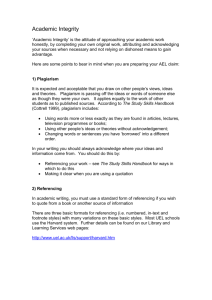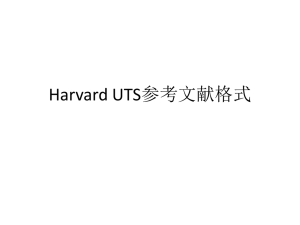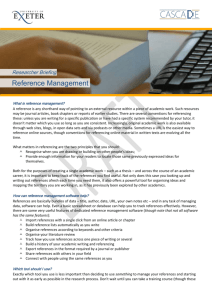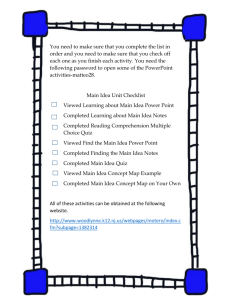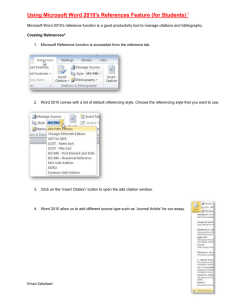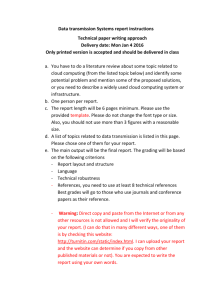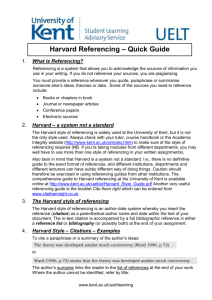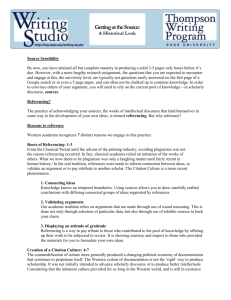Harvard Referencing Guide (Author-Date Style)
advertisement
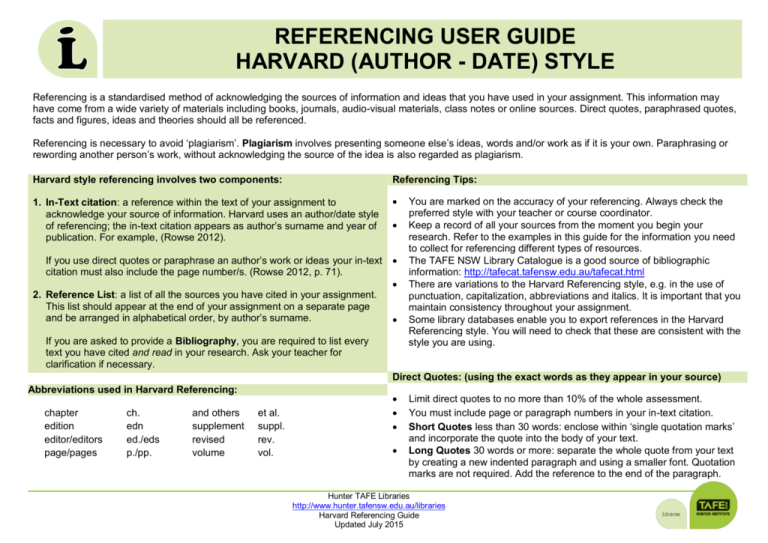
REFERENCING USER GUIDE HARVARD (AUTHOR - DATE) STYLE Referencing is a standardised method of acknowledging the sources of information and ideas that you have used in your assignment. This information may have come from a wide variety of materials including books, journals, audio-visual materials, class notes or online sources. Direct quotes, paraphrased quotes, facts and figures, ideas and theories should all be referenced. Referencing is necessary to avoid ‘plagiarism’. Plagiarism involves presenting someone else’s ideas, words and/or work as if it is your own. Paraphrasing or rewording another person’s work, without acknowledging the source of the idea is also regarded as plagiarism. Harvard style referencing involves two components: Referencing Tips: 1. In-Text citation: a reference within the text of your assignment to acknowledge your source of information. Harvard uses an author/date style of referencing; the in-text citation appears as author’s surname and year of publication. For example, (Rowse 2012). If you use direct quotes or paraphrase an author’s work or ideas your in-text citation must also include the page number/s. (Rowse 2012, p. 71). You are marked on the accuracy of your referencing. Always check the preferred style with your teacher or course coordinator. Keep a record of all your sources from the moment you begin your research. Refer to the examples in this guide for the information you need to collect for referencing different types of resources. The TAFE NSW Library Catalogue is a good source of bibliographic information: http://tafecat.tafensw.edu.au/tafecat.html There are variations to the Harvard Referencing style, e.g. in the use of punctuation, capitalization, abbreviations and italics. It is important that you maintain consistency throughout your assignment. Some library databases enable you to export references in the Harvard Referencing style. You will need to check that these are consistent with the style you are using. 2. Reference List: a list of all the sources you have cited in your assignment. This list should appear at the end of your assignment on a separate page and be arranged in alphabetical order, by author’s surname. 3T If you are asked to provide a Bibliography, you are required to list every text you have cited and read in your research. Ask your teacher for clarification if necessary. 3T Direct Quotes: (using the exact words as they appear in your source) Abbreviations used in Harvard Referencing: chapter edition editor/editors page/pages ch. edn ed./eds p./pp. and others supplement revised volume et al. suppl. rev. vol. Limit direct quotes to no more than 10% of the whole assessment. You must include page or paragraph numbers in your in-text citation. Short Quotes less than 30 words: enclose within ‘single quotation marks’ and incorporate the quote into the body of your text. Long Quotes 30 words or more: separate the whole quote from your text by creating a new indented paragraph and using a smaller font. Quotation marks are not required. Add the reference to the end of the paragraph. 3T 3T 3T 3T Hunter TAFE Libraries http://www.hunter.tafensw.edu.au/libraries Harvard Referencing Guide Updated July 2015 Source In-Text Citation Reference List Name of author or editor (Surname, Initials) year of publication, Title (in italics), edition, volume, publisher, place of publication. Books Book with single author or editor Author’s surname occurs as part of the sentence: Garner (2007) discusses ways for reducing water… Garner, JD 2007, Dry gardening Australia: sustainable drought-proof gardening from the soil up, Murdoch Books, Millers Point, NSW. Blainey, G 2001, The tyranny of distance: how distance shaped Australia's history, rev. edn, Sun Books, Melbourne. Hughes, R & Thompson J 2012, Business budgeting, National Core Accounting Publications, Bondi, NSW. Nankervis, A, Compton, R & Baird, M 2011, Human resource management: strategy and process, Cengage Learning, South Melbourne, Vic. If author’s name is not part of the sentence: Improved rates of nutrition were important to the success of the voyage (Blainey 2001). Book with two or three authors or editors Book with more than three authors or editors Cite all authors in the order that they are listed on the title page. Use the ampersand (& symbol) when citing within parenthesis. Use ‘and’ when the authors’ names are incorporated in the text. A recent study (Hughes & Thompson 2012) shows … Nankervis, Compton and Baird (2011) suggest … Use the first author listed on the title page followed by et al. …due to insufficient insulin (Breskin et al. 2008, pp. 187-188). Show the names of all authors in the bibliography: Breskin, M, Dumith, K, Pearsons, E & Seeman, RG (eds) 2008, McGraw-Hill medical dictionary for allied health, McGraw Hill, New York. Bloom, G, Jealous, V, Kelly, P & Grosberg, M 2009, Philippines, Lonely Planet Publications, Footscray, Vic. Bloom et al. (2009) discuss traditional … No publication date Use n.d. instead of the year: Teubner (n.d.) states that Teubner, C n.d., The chocolate Bible: the definitive sourcebook, Chartwell Books, Edison, NJ. No author Cite using the title: The SBS World Guide (2010) defines…. SBS World Guide 2010, Text Publishing, Melbourne. Melting ice - rising seas: the frontline of global warming 2006, UGI Briefing 146, Understanding Global Issues Ltd, Cheltenham, England. … in Antarctica (Melting ice - rising seas: the frontline of global warming, 2006). Hunter TAFE Libraries http://www.hunter.tafensw.edu.au/libraries Page 2 Harvard Referencing Guide Updated July 2015 Source In-Text Citation Reference List Organisation (no author provided) Cite using the name of the organisation or group: The United Nations Development Programme (2000) suggested that … Citations from a secondary source Cite both authors: Only list the work that you accessed in your reference list: ‘…and is one with the Nation’ (Beik, 1970 Adcock, M 2004, Analysing the French Revolution, Cambridge University cited in Adcock 2004, p. 7). Press, Cambridge. An article or chapter within an edited book Acknowledge both authors: ‘The nation is demanding of its political leadership to take us forward’ (Rudd, cited in Healey, 2008, pp. 14-16). Author of chapter, year of publication, ‘chapter title’ (in single quotation marks), in editor/s of book, title of book (in italics), publisher, place of publication, page numbers of chapter. Rudd, K 2008, 'The apology to Australia's indigenous peoples', in J Healey (ed.) 2009, Stolen generations: the way forward, Spinney Press, Thirroul, NSW, pp. 14-16. eBook …. Klugman & Osmond (2013). (Austen 1998, pp.1-27) Include: viewed date, name of eBook database or <URL>. Klugman, M, & Osmond, G 2013, Black and proud: the story of an iconic AFL photo, NewSouth Publishing, Sydney, N.S.W, viewed 4 February 2014, EBSCOhost eBook Collection. United Nations Development Programme 2000, World resources 2000-2001: people and ecosystems: the fraying web of life, World Resources Institute, Washington, DC. Austen, J 1998, Pride and prejudice, Project Gutenberg, viewed 23 July 2013, <http://www.gutenberg.org/files/1342/1342.txt >. 3TU U3T Image, figure or table from Books Provide a caption and citation below the image. Indicate the image type and number according to its placement in your work (eg: Image 1, Image 2, Table 1). Name of creator/organisation year, Title (in italics), description of document, in source of image, page. Image, figure or table Image 1: Marilyn Monroe by Andy Warhol (n.d.). Warhol, A n.d., ‘Marilyn Monroe’, silk screen print, in J Berger 2008, Ways of seeing, British Broadcasting Corporation and Penguin Books, London, p.137. Hunter TAFE Libraries http://www.hunter.tafensw.edu.au/libraries Page 3 Harvard Referencing Guide Updated July 2015 Source In-Text Citation Reference List Author (surname, initials) year of publication, ‘Title of Article’ (in single quotation marks), Journal Title (in italics), volume number, issue number, page numbers of article. Journal Articles Printed journal or magazine article Recent research suggests a higher dingo population can lead to fewer foxes and cats (Johnson 2013). Journal Article retrieved from database or website Dray (2013) discusses various reasons for Harwood’s use of numerous pseudonyms. Include the viewed date, database provider or <URL>. Dray, C 2013, ‘Harwood’s monster: “Walter Lehmann” and the embodied subject’, Antipodes, vol. 27, no. 1, pp. 61-68, viewed 24 October 2013, General OneFile database. Resilience refers to ‘the capacity of an individual to do well in spite of exposure to acute trauma or sustained adversity’ (Liebenberg 2012 cited in Grossman 2013, para. 6). Johnson, C 2013, ‘Dingoes for wildlife’, Wildlife Australia, vol. 50, no. 2, pp. 18-21. Grossman, M 2013, ‘Prognosis critical: resilience and multiculturalism in contemporary Australia’, M/C Journal, vol. 16, no. 5, viewed 18 November 2013, <http://journal.media-culture.org.au/index.php/mcjournal/article/view Article/699>. 3TU U3T Author (surname, initials) year of publication, ‘Title of article’ (in single quotation marks), Newspaper Title (in italics), Day and Month of publication, page number of article. Newspaper Articles Newspaper print article with an author Cronshaw (2013, p.5) outlines the Online newspaper article Arup (2013) reports on an increase in global warming… Include page numbers if available, viewed date, <URL>. Arup, T 2013, ‘Climate report heralds grave fears for state of the planet’, The Sydney Morning Herald, 22 September, viewed 30 October 2013, <http:// www.smh.com.au/environment/climate-change/climate-report-heralds-gravefears-for-state-of-the-planet-20130921-2u6fk.html>. Cronshaw, D 2013, ‘Send in the clones’, Newcastle Herald, 29 October, p. 5. 3TU U3T Newspaper Article from a database … in a statement given by the Salvation Army (Wingate-Pearse 2013). Include page numbers if available, viewed date, Database Provider. W ingate-Pearse, G 2013, ‘New homeless support model leads to closure’, Newcastle Herald, 12 October, p. 8, viewed 18 November 2013, Proquest Australia & New Zealand Newsstand. 3T Hunter TAFE Libraries http://www.hunter.tafensw.edu.au/libraries Page 4 Harvard Referencing Guide Updated July 2015 3T7 7T Source In-Text Citation Reference List Newspaper article – No author Provide all details in the in-text citation – name of newspaper, full date of publication and page reference. No need for entry in reference list. Online & Multimedia Sources Use the author (person or organisation) and date (created or last revised) Author (surname, initials) year of publication, Title (in italics), description of document (if applicable), name and place of company/organisation, viewed date, <URL>. Website, web page or online document A bill is being introduced to crack down on cyber bullying (Sydney Morning Herald 6 November 2013, p. 17). Nita Bernice Kibble was born in 1879 in Denman, Australia (Arnot 1983). Arnot, JF 1983, Kibble, Nita Bernice (1879-1962), Australian Dictionary of Biography, viewed 21 January 2009, <http://adbonline.anu.edu.au/biogs /A090585b.htm?hilite=nita%3Bkibble>. 3TU U3T No author: cite using the website/webpage title No date: use nd Video or sound recording (DVD, CD) Online video & audio, podcast, vodcast, YouTube, Vimeo etc. …is the second most common cause of dementia (Alzheimer’s Australia 2010). Alzheimer’s Australia 2010, ‘Types of dementia’, Understanding dementia, viewed 20 November 2013, <http://www.fightdementia.org.au/understanding -dementia/types-of-dementia.aspx> 3TU U3T Presenter or Title year of production ... Perth in the 1950’s (Tim Winton’s Cloud Street 2011). Artist/presenter if known Year of production, Title, Format (eg. video recording), Publisher or Production Company, Place. Tim Winton’s cloud street 2011, video recording, ShowTime Australia. Australian musician Paul Kelly uses song as a form of storytelling (2008). Presenter or Title year of production … as shown in Knives are out – using kitchen knives correctly (2002). …increased sense of connectedness (Dawesar 2013). Kelly, P 2008, Paul Kelly greatest hits, sound recording, Universal Music Australia. Artist/presenter if known Year of production, Title, Format (eg. video recording), Publisher or Production Company, Place of recording, date accessed, <URL>. Knives are out – using kitchen knives correctly 2002, video recording, VEA, Australia, viewed 29 July 2013, <http://huntertafe.libguides.com/vlearn>. 3TU U3T Dawesar A 2013, Life in the "digital now", video recording, TED Conferences, LLC, viewed 20 November 2013, < http://www.ted.com/talks/ abha_dawesar_life_in_the_digital_now.html>. 4T 4T 4T 4T 3TU U3T Hunter TAFE Libraries http://www.hunter.tafensw.edu.au/libraries Page 5 Harvard Referencing Guide Updated July 2015 Source In-Text Citation Reference List Online image, figure or table Image 2: Hit The Bricks Festival artwork in progress, Newcastle NSW (McGowan & Kirkwood 2013) Figure 1: Australia’s unemployment rate, 2012-2013 (Australian Bureau of Statistics 2013). Name of creator/organisation year, Title (in italics), description of document, viewed date, <URL>. McGowan, M & Kirkwood, I 2013, ‘Hit the bricks festival: photos, poll’, Newcastle Herald, 24 November, online photo gallery, viewed 26 November 2013, <http://www.theherald.com.au/story/1929507/hit-the-bricks-festivalphotos-poll/#slide=3>. 3TU U3T Australian Bureau of Statistics 2013, ‘Australia’s unemployment rate’, Labour force, Australia, graph, viewed 19 November 2013, <http://www.ausstats.abs. gov.au/ausstats/meisubs.nsf/0/634CADD939583BF9CA257C1B000D8805/$ File/62020_oct%202013.pdf >. 3TU U3T Personal communication Lecture In-text citation must include the author’s name, full date and form of communication In 2004, the Manager of GMA, Mr Peter Emslie (21 January, email) stated that trade relations are improving. … students that seek help in the first four weeks are much more likely to succeed (Mahoney 2013). Information obtained through personal communication – a letter, interview, phone call or email does not need to be included in your reference list. Provide all the details in the in-text citation only. You must have permission from the person you are citing before using personal communications as a source in your assignment. Name of lecturer (surname, initials) year, ‘title of lecture’, Lecture, place, date. Mahoney, SE 2013, ‘Study Skills’, Lecture, Hunter TAFE, Belmont Campus, 15 June. More research help is available at your local TAFE Library and on the Hunter TAFE Library Portal: http://huntertafe.libguides.com/research 3TU References: Monash University Library 2012, Citing and referencing: Harvard referencing guide, Monash University, Vic., viewed 25 November 2013, <http://guides.lib.mon ash.edu/content.php?pid=346637&sid=2835365>. Snooks and Co. (rev.) 2002, Style manual for authors, editors and printers, 6th edn, John Wiley & Sons Australia, Ltd., Milton, Qld. [Copies are available from all TAFE NSW libraries]. Summers, J & Smith, B 2010, Communication skills handbook, John Wiley & Sons Milton, Qld. 3TU U3T Hunter TAFE Libraries http://www.hunter.tafensw.edu.au/libraries Page 6 Harvard Referencing Guide Updated July 2015
